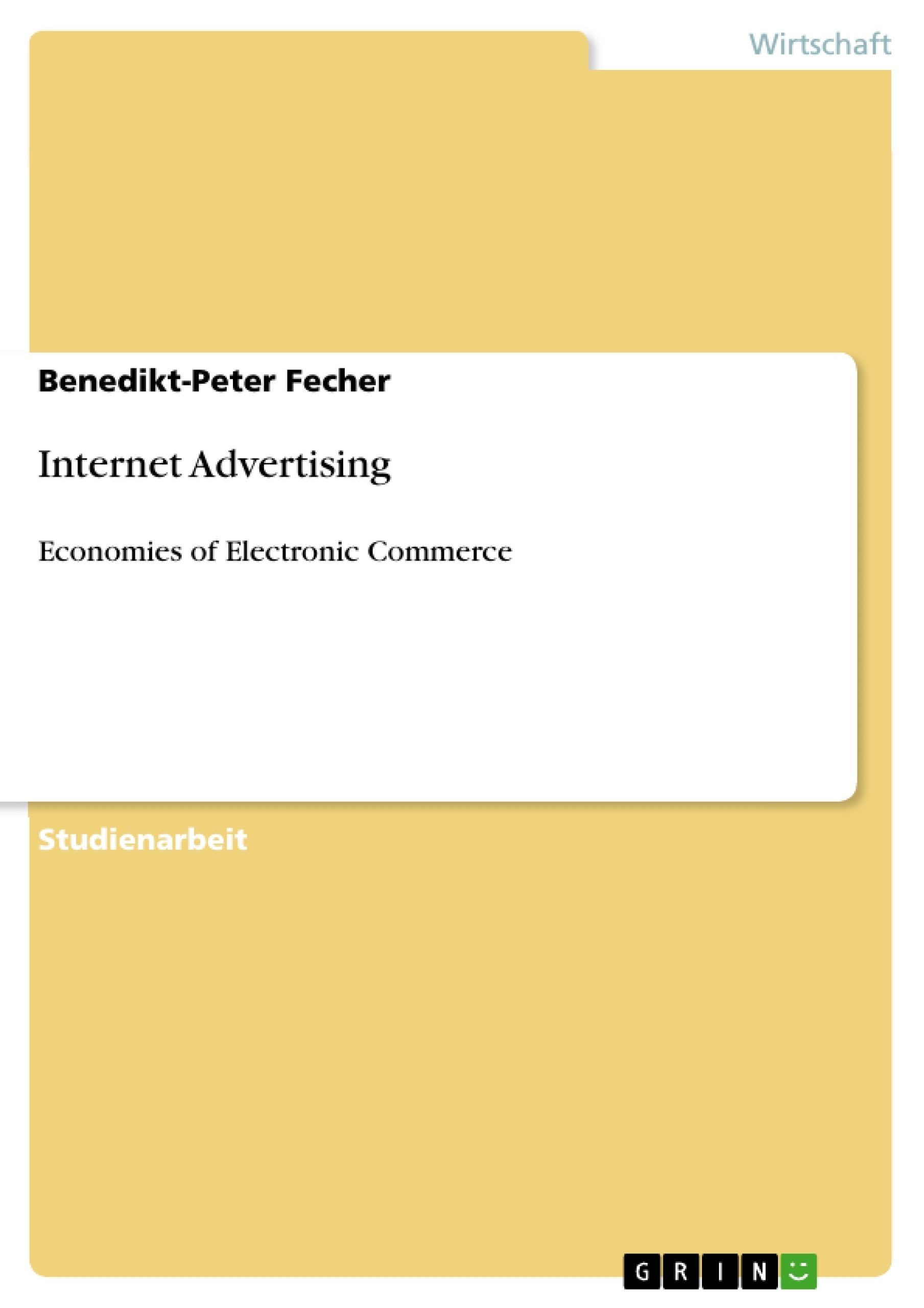According to a recent study from the Nielsen Media Research, only 2.9 per cent of the whole advertising budget in Germany was spent in Internet Marketing in 2006. A number that is -compared to TV (34.7 per cent) and print media (39.8 per cent) - still relatively small. Yet the market for Internet Advertising marginally records a significant growth within the last years. In 2001 the online spendings totalled up to 211 million Euros. Five years later this number already increased threefold to 692 million Euros. Considering the rapid spread and growing importance of the Internet it is foreseeable that also the market for Internet Advertising will further expand – posing therefore new challenges not only to advertisers. From the economic perspective the question appears if classical approaches and assumptions also apply for the market of Internet Advertising.
The paper surveys Internet Advertising in general. It observes the historical development of Internet Advertising, compares search goods and experience goods, distinguishes in this respect informational from persuasive advertising and finally defines factors that influence the welfare of society.
Inhaltsverzeichnis
- Introduction
- Main Part
- The commercialization of the Internet
- Pros and Cons of Internet Advertising
- Search goods and experience goods – which kind of advertising applies to each?
- Search goods and experience goods
- Informational versus persuasive advertising – which applies to search and experience goods
- When is informational advertising successful?
- Advertising and social welfare
- Advantages and disadvantages of advertising for the social welfare
- Is there a socially optimal amount of Advertising?
- From an interdisciplinary perspective
- Bibliography
- Books & Articles
- Internet Sources
Zielsetzung und Themenschwerpunkte
Diese Arbeit befasst sich mit der Thematik der Internetwerbung und analysiert deren Entwicklung, Funktionsweise und Auswirkungen auf die Gesellschaft. Sie untersucht die verschiedenen Formen der Internetwerbung, insbesondere im Kontext von Such- und Erfahrungsgütern, und beleuchtet die Rolle der Informations- und Überzeugungswerbung. Darüber hinaus werden die Auswirkungen der Internetwerbung auf das soziale Wohlbefinden und die Frage nach einem optimalen Werbeaufkommen diskutiert.
- Entwicklung der Internetwerbung
- Unterscheidung zwischen Such- und Erfahrungsgütern
- Rolle der Informations- und Überzeugungswerbung
- Auswirkungen der Internetwerbung auf das soziale Wohlbefinden
- Optimales Werbeaufkommen
Zusammenfassung der Kapitel
Das erste Kapitel führt in die Thematik der Internetwerbung ein und beleuchtet die historische Entwicklung sowie die Bedeutung des Mediums im Vergleich zu anderen Werbeformen. Es wird die rasante Entwicklung der Internetwerbung in den letzten Jahren aufgezeigt und die Bedeutung des interaktiven Marketings im Kontext der Internetwerbung hervorgehoben.
Das zweite Kapitel befasst sich mit den verschiedenen Formen der Internetwerbung und untersucht die Unterschiede zwischen Such- und Erfahrungsgütern. Es wird die Rolle der Informations- und Überzeugungswerbung im Kontext dieser Gütertypen analysiert und die Frage nach der Effektivität der Informationswerbung diskutiert.
Das dritte Kapitel untersucht die Auswirkungen der Internetwerbung auf das soziale Wohlbefinden. Es werden die Vor- und Nachteile der Internetwerbung für die Gesellschaft diskutiert und die Frage nach einem optimalen Werbeaufkommen beleuchtet.
Schlüsselwörter
Die Schlüsselwörter und Schwerpunktthemen des Textes umfassen Internetwerbung, Suchgüter, Erfahrungsgüter, Informationswerbung, Überzeugungswerbung, Social Welfare, optimales Werbeaufkommen, interaktives Marketing, Bannerwerbung, Cookies, Online-Marketing, digitale Werbung, digitale Wirtschaft.
Häufig gestellte Fragen
Was ist der Unterschied zwischen Suchgütern und Erfahrungsgütern?
Suchgüter können vor dem Kauf beurteilt werden (z.B. Preis, technische Daten), während die Qualität von Erfahrungsgütern erst nach dem Konsum feststellbar ist (z.B. Wein, Urlaub).
Was unterscheidet informative von persuasiver Werbung?
Informative Werbung liefert Fakten und Daten, während persuasive Werbung darauf abzielt, durch Emotionen und Überzeugung das Kaufverhalten zu beeinflussen.
Wie hat sich der Markt für Internetwerbung entwickelt?
In Deutschland stiegen die Online-Werbeausgaben von 211 Millionen Euro im Jahr 2001 auf 692 Millionen Euro im Jahr 2006, was ein massives Wachstum signalisiert.
Welchen Einfluss hat Werbung auf das soziale Wohlbefinden (Social Welfare)?
Werbung kann den Wettbewerb fördern und Informationen liefern, aber auch zu einer Überflutung mit unnötigen Reizen führen, weshalb nach einem gesellschaftlichen Optimum gesucht wird.
Welche Rolle spielen Cookies im Online-Marketing?
Cookies ermöglichen es Werbetreibenden, das Nutzerverhalten zu verfolgen und personalisierte Werbung auszuspielen, was die Effektivität von Kampagnen erhöht.
- Quote paper
- Benedikt-Peter Fecher (Author), 2008, Internet Advertising , Munich, GRIN Verlag, https://www.grin.com/document/129345



